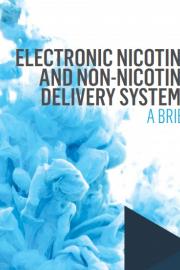
Os sistemas eletrônicos de entrega de nicotina e não nicotina (EN e NNDS) são uma classe heterogênea de produtos que use uma bobina eletricamente alimentada para aquecer e transformar um líquido em um aerossol, que é inalado pelo usuário. Embora as consequências dos efeitos de longo prazo sobre a morbidade e mortalidade ainda não tenham sido
estudados suficientemente, esses dispositivos não são seguros para jovens, mulheres grávidas e adultos que nunca fumaram.
WORLD HEALTH ORGANIZATION. Electronic nicotine and non-nicotine delivery systems: a brief. Dinamacar, 2020. Disponível em: https://www.euro.who.int/__data/assets/pdf_file/0009/443673/Electronic-n.... Acesso em: 12 mar. 2021.
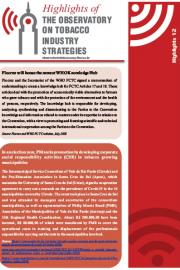
fact sheets with the topics considered outstanding in order to promote debates and decision making in the scope of tobacco control. In this edition, the following points are presented: Fiocruz will house the newest WHO knowledge center; in an election year, Philip Morris aims to promote corporate social responsibility (CSR) actions in tobacco producing municipalities; partnerships with the tobacco industry conflict with public health interests; good news: Marvel and Netflix pledge to decrease cigarette display.
KORNALEWSKI, Alex Medeiros; CARVALHO, Daniel da Costa e Silva de; BARATA, Danielle; LEONEL, Filipe; TURCI, Silvana Rubano. Destaques do Observatório sobre as Estratégias da Indústria do Tabaco. Cetab/Ensp/Fiocruz, Rio de Janeiro, mai. 2017. Acesso em: 13 jul. 2017.
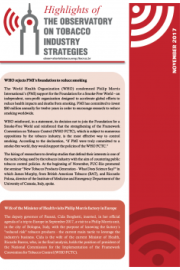
In this edition, the following subjects are presented: The World Health Organization (WHO) rejects the founding of Philip Morris International (PMI) to reduce smoking; Wife of the Minister of Health visits Philip Morris factory in Europe; Illegal advertising campaign of tobacco products on the Internet and São Paulo City Hall disregard request for a partnership break with the tobacco industry.
KORNALEWSKI, Alex Medeiros; CARVALHO, Alexandre Octavio Ribeiro de; BARATA, Danielle; LEONEL, Filipe; TURCI, Silvana Rubano. Destaques do Observatório sobre as Estratégias da Indústria do Tabaco. Cetab/Ensp/Fiocruz, Rio de Janeiro, set. 2018. Acesso em: 25 jul. 2018.
Background: The tobacco industry works to block, delay and weaken national tobacco control legislation to implement the FCTC. This paper reviews how Nepal overcame industry opposition and to a comprehensive tobacco control law implementing the FCTC.
Methods: We triangulated newspaper articles and policy documents with key informant interviews.
Results: With the support of international health groups, local tobacco control advocates worked with policymakers in Nepal to pass a comprehensive tobacco control law that exceeded FCTC obligations. The tobacco industry exploited a time of political transition to block consideration by Parliament, arranged and sponsored foreign tours for legislators, made death threats to tobacco control advocates and their families, and argued for the economic importance of tobacco farms. Despite strong interference from Health, and Law and Justice ministers, a 2009 Supreme Court ruling helped tobacco control advocates secure a comprehensive tobacco control law in 2011 that included rotating pictorial health warning labels covering 75% of both sides of cigarette packages, 100% smoke free public places and workplaces, private homes and vehicles, and a tobacco advertising, promotion and sponsorship ban.
Conclusions: Advocates in developing countries should utilize Nepal's experience to reject tobacco industry offers of compromise and continue educating politicians and legislators to generate political support to pass a comprehensive tobacco control law. Technical and financial support from international agencies, and effective collaboration and coordination of civil societies, and utilization of domestic litigation are helpful in LMICs where governance is weak.
Implications: The tobacco industry exploited a time of political transition in Nepal in its effort to block comprehensive tobacco control policy in Parliament by sponsoring foreign tours of legislatures, making death threats to tobacco control advocates and their families, and arguing for the economic importance of tobacco farms. Tobacco control advocates used litigation to raise awareness and educate legislators, and promote strong legislation with the involvement of international health groups. Technical and financial support from international agencies, and effective collaboration and coordination of civil societies, and utilization of domestic litigation are helpful in LMICs where governance is weak.
BHATTA, D. N. et al. Exceeding FCTC obligations: Nepal overcoming tobacco industry interference to enact a comprehensive tobacco control policy. Nicotine & Tobacco Research: Official Journal of the Society for Research on Nicotine and Tobacco, Reino Unido, v. xx, n. xx, p. 1-11, set. 2019.
Introduction: Nepal passed a comprehensive tobacco control law in 2011. Tobacco control advocates successfully countered tobacco industry (TI) interference to force implementation of law.
Aims and Methods: Policy documents, news stories, and key informant interviews were triangulated and interpreted using the Policy Dystopia Model (PDM).
Results: The TI tried to block and weaken the law after Parliament passed it. Tobacco control advocates used litigation to force implementation of the law while the TI used litigation in an effort to block implementation. The TI argued that tobacco was socially and economically important, and used front groups to weaken the law. Tobacco control advocates mobilized the media, launched public awareness campaigns, educated the legislature, utilized lawsuits, and monitored TI activities to successfully counter TI opposition.
Conclusions: Both tobacco control advocates and the industry used the discursive and instrumental strategies described in the PDM. The model was helpful for understanding TI activities in Nepal and could be applied to other low- and middle-income countries. Civil society, with the help of international health groups, should continue to track TI interference and learn the lessons from other countries to proactively to counter it.
Implications: The PDM provides an effective framework to understand battles over implementation of a strong tobacco control law in Nepal, a low- and middle-income country. The TI applied discursive and instrumental strategies in Nepal in its efforts to weaken and delay the implementation of the law at every stage of implementation. It is important to continuously monitor TI activities and learn lessons from other countries, as the industry often employ the same strategies globally. Tobacco control advocates utilized domestic litigation, media advocacy, and engaged with legislators, politicians, and other stakeholders to implement a strong tobacco control law. Other low- and middle-income countries can adapt these lessons from Nepal to achieve effective implementation of their laws.
BHATTA, D. N. et al. Defending comprehensive tobacco control policy implementation in Nepal from tobacco industry interference (2011-2018). Nicotine & Tobacco Research: Official Journal of the Society for Research on Nicotine and Tobacco, Reino Unido, v. xx, n. xx, p. 1-10, abr. 2020.
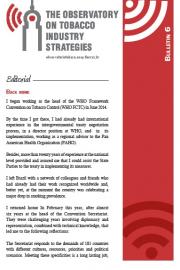
Bulletin six published by the Tobacco and Health Studies Center of the Sergio Arouca National School of Public Health of the Oswaldo Cruz Foundation (Cetab / Ensp / Fiocruz). This edition is composed of an editorial signed by Vera Luiza da Costa e Silva, former head of the Secretary of the Framework Convention for Tobacco Control - WHO, in addition to containing the following texts: Observatory on tobacco industry strategies completes 4 years and launches section on Covid-19; Summary of STOP monitoring: tobacco industry responses to the Covid-19 pandemic and the radar section with the latest reports.
BACK home [bulletin SIX]. Cetab/Ensp/Fiocruz, Rio de Janeiro, n. 6, 26 jun. 2020.
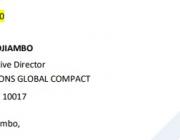
"Nós, os representantes da sociedade civil solicitamos que a Fundação para Eliminação do Trabalho Infantil no Cultivo de Tabaco (ECLT) seja removida como participante do Pacto Global das Nações Unidas (UNGC), de acordo com as políticas da ONU, incluindo a atualização da política de 2017 do UNGC: 1 a Política Modelo para Agências do Sistema das Nações Unidas para a Prevenção da Interferência da Indústria do Tabaco (Política Modelo); 2 e os Objetivos de Desenvolvimento Sustentável das Nações Unidas (ODS da ONU), que incorporam a Convenção-Quadro da Organização Mundial da Saúde para o Controle do Tabaco (OMS FCTC). 3 O ECLT é indissociável da indústria do tabaco e tem falhado sistematicamente em seu objetivo declarado de acabar ou mesmo reduzir o trabalho infantil no tabaco - um problema diretamente ligado às práticas de exploração de seus financiadores e membros."
OJIAMBO, Sanda. UNGC Rejeita parceria com a TI ECLT [carta]. Estados , Unidos, abr. 2020.
A special issue of Drugs and Alcohol Today explores progress towards the goals outlined in the Framework Convention on Tobacco Control (FCTC). Featuring the following peer-reviewed articles by Foundation staff, grantees, and other prominent experts, the issue also describes strategies for improving the FCTC and its implementation.
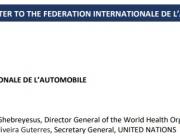
Carta de vários representantes da sociedade civíl direcionada ao presidente da Federação Internacional de Automobilismo (FIA), sobre a questão da publicidade de produtos derivados do tabaco e seus respectivos patrocínios na Fórmula 1.
UMA CARTA aberta a [Jean Todt, presidente] da Federação International de Automobilismo. França, 20 ago. 2020.

Este artigo tem como objetivo geral a necessidade de redução dos danos do tabaco, os produtos de consumo que facilitam a redução dos danos do tabaco e as barreiras para sua implementação. A endemia mundial do tabagismo resulta na morte de mais de sete milhões de fumantes por ano. As taxas de abandono do cigarro são muito baixas, de 3% a 12%, e as taxas de recaída são altas, de 75% a 80% nos primeiros seis meses e 30% a 40% mesmo após um ano de abstinência. Além disso, alguns fumantes não desejam parar. A substituição do cigarro na redução de danos do tabaco é uma estratégia que pode reduzir o fardo da morbidade e mortalidade.
O'LEARY, Renée; POLOSA, Riccardo. Tobacco harm reduction in the 21st century. Emerald Publishing Limited, Reino Unido, v. 20, n. 3, p. 219-234, 2020. Disponível em: https://www.emerald.com/insight/content/doi/10.1108/DAT-02-2020-0007/ful.... Acesso em: 29 mar. 2021.